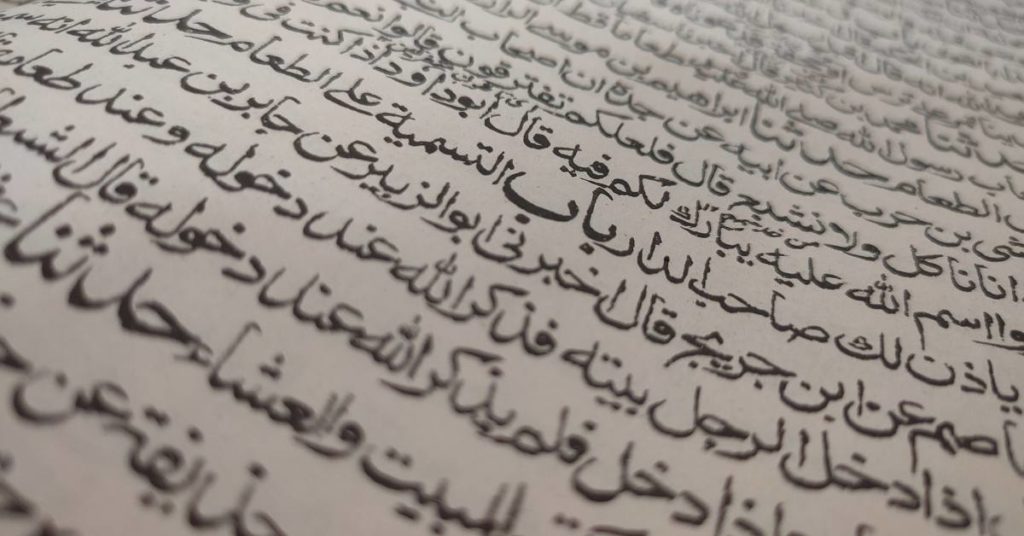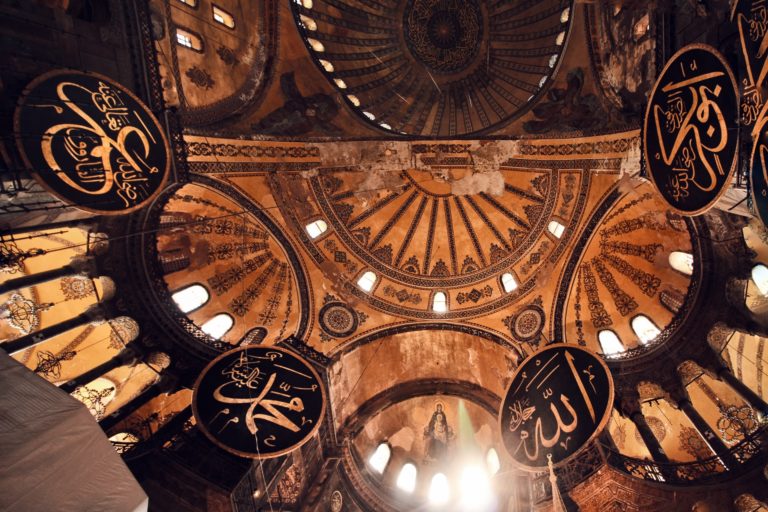What is a Maqra’ah?
A maqra’ah is the proficient recital in Arabic of a classical Islamic text. This is done in order to compare variable manuscripts. And preserve aural transmission of works that have been passed on from generation to generation over many centuries until the present day.
This is usually conducted under the guidance of at least one muḥaddith who has received ijāzah (license to transmit) from their shuyūkh (teachers) in these texts. And who upon completion passes their transmission of the texts with ijāzah and chains of narration on to those who have listened to the reading so that the aural tradition in these works continues to be carried forward and remain extant.



What Are the Benefits of a Maqra’ah?
In this short article, I have provided thirty distinct benefits of a maqra’ah that one may derive from the majālis of ḥadīth. These advantages are self-explanatory and answer the doubts and criticisms that some may level at these majālis. Owing to an ignorance of their true spirit and nature.
By the grace of Allāh, these events continue to spread throughout the world. Since those who have experienced the barakah, inform others.
The benefits for a maqra’ah include, but are not limited to:
▪ Increasing the love of the Prophet ﷺ and his pristine sunnah in our hearts. Because the more you read about him, the more you realise his status and are taken in awe by his magnificence.
▪ The preservation of a unique system of transmission (isnād) that extends back over 1400 years. And up until the advent of modern academia was widespread in the ummah. Some Islamic texts have altogether lost the aural transmission that they had boasted for hundreds of years before their recent neglect.
▪ Inclusion of your name in a chain of narration that ends with you and goes back through Islām’s greatest scholars. Linking you to the most blessed of creation our Beloved ﷺ which is a great source of honour and blessings.
▪ The entire gathering sends hundreds of thousands of salutations (ṣalawāt) on our Beloved ﷺ every time they hear his noble name over the course of the majlis.
▪ Establishing a bond between you and the celebrated scholars of the past. So that when you quote something from Imām al-Bukhārī, Imām al-Nawawī and others, you are quoting from your own shuyūkh (as you are connected to them through isnād). Contrary to simply quoting from a book as any other academic would do.
▪ Improve the speed and proficiency of reading Arabic for both the reader and those that are following the maqra’ah. This is an essential skill for any student of knowledge.
▪ The spread and revival of isnād for mainstream classical texts throughout the Islamic World. For example: Previously, in a South African majlis, people from over 20 countries participated. And in many of these countries not a single person existed who narrated through isnād. Those who have inherited the isnād will now return to their countries as ambassadors of the pristine sunnah. They will revive the tradition that existed several hundred years ago in places such as Timbuktu, Banjul and other famous cities of Africa.
▪ Allow us to appreciate the richness, breadth and depth of the corpus of Islamic literature in times where people have become engrossed in reading about other civilizations and fantasies.
▪ Build our appreciation of fiqh (Islamic jurisprudence) by reading the proofs that the madhāhib have established their rulings upon.
▪ Increase your knowledge of the ḥadīth terminology used by muḥaddithīn when describing the reports in their collections.
▪ Develop the time/events management skills that are an essential skill of any dedicated student of knowledge in their pursuit of the sacred sciences.
▪ Be constantly sitting in the company of senior ʿulamā’ for long hours. With the ability to observe their comportment and take from their adab before their knowledge.
▪ Rekindle the unity of this Ummah and the brotherhood that all Muslims have between themselves. Irrespective of skin colour, caste or socio-economic factors.
▪ Becoming attached to the sunnah of our Beloved ﷺ through the learning of his noble mission, biography, character, appearance and all other sublime qualities that he possessed.
▪ Earning the great reward promised to the people who set out in the pursuit of the sacred sciences.
▪ Affords one with an opportunity to make new like-minded friends who are willing to dedicate hours to these blessed majālis. This company instead of distracting you and being a source of remorse for you on the day of qiyāmah, will aid you in worshipping Allāh ﷻ.
▪ Learning about asbāb al-nuzūl or the cause for the revelation of various āyāt from the Qur’ān. So we know the context in which Allāh revealed them. And are able to rectify the misunderstanding of modernists in their interpretation of these verses.
▪ Read aḥādīth of targhīb (virtues that encourage) and tarhīb (punishments that discourage). This will encourage us a desire to do good actions and discourage us from sinning.
▪ Being amongst those who are observing the farḍ kifāyah action of safeguarding the isnād of this ummah.
▪ Get used to listening to Arabic while it is spoken or read fast. Therefore, improving your overall listening skill which is yet another of the four primary skills required in language acquisition.
▪ Learning how the muḥaddithīn would use abbreviations in the isnād to mean different things. Such as ح for taḥwīl of the isnād.
▪ The revival and imitation of a practice that the muḥaddithīn conducted for hundreds of years. With the hope that through Allāh’s compassion, He will raise us in the hereafter with those that we imitate.
▪ Increasing your knowledge of the aḥādīth that are weak or strange. This is done by reading the statements of the muḥaddithīn such as Imām al-Tirmidhī رحمه الله.
▪ Earn the great reward of observing nafl (optional) iʿtikāf in the masājid for extensive periods. This creates an attachment to this serene and blessed environment in the company of malā’ikah (angels) that would not otherwise be made available to one.
▪ Knowing more about the ʿulamā’ in your isnād who have preserved this unique tradition over hundreds of years.
▪ Improving and correcting the recitation of difficult words that we would not normally come across other than in specialist ḥadīth and fiqh texts.
▪ A source of reward for the elderly ʿulamā’ whom after their demise will continue receiving perpetual reward for everyone that attends. And narrates through the isnād they inherited from these scholars; and the same for you when you pass away.
▪ Gathering people together from different nationalities and backgrounds all of whom have one common trait; they are Muslims and leaving the company of the disbelievers for long periods of time which cleanses the heart from the harmful effects of evil environments.
▪ Improvement in akhlāq, by reading how the disbelievers would treat our Beloved ﷺ and his companions رضي الله عنهم and the akhlāq that he would reciprocate with.
▪ Be part of a majlis which is sought out by the Angels. And discussed by with your Lord who then forgives you for the sins you have done. As occurs in the following ḥadīth that occurs in both Ṣaḥīḥ al-Bukhārī and Ṣaḥīḥ Muslim:
حَدَّثَنَا قُتَيْبَةُ بْنُ سَعِيدٍ، حَدَّثَنَا جَرِيرٌ، عَنِ الأَعْمَشِ، عَنْ أَبِي صَالِحٍ، عَنْ أَبِي هُرَيْرَةَ، قَالَ: قَالَ رَسُولُ اللَّهِ صَلَّى اللهُ عَلَيْهِ وَسَلَّمَ: إِنَّ لِلَّهِ مَلاَئِكَةً يَطُوفُونَ فِي الطُّرُقِ يَلْتَمِسُونَ أَهْلَ الذِّكْرِ، فَإِذَا وَجَدُوا قَوْمًا يَذْكُرُونَ اللَّهَ تَنَادَوْا: هَلُمُّوا إِلَى حَاجَتِكُمْ. قَالَ: «فَيَحُفُّونَهُمْ بِأَجْنِحَتِهِمْ إِلَى السَّمَاءِ الدُّنْيَا» قَالَ: فَيَسْأَلُهُمْ رَبُّهُمْ، وَهُوَ أَعْلَمُ مِنْهُمْ، مَا يَقُولُ عِبَادِي؟ قَالُوا: يَقُولُونَ: يُسَبِّحُونَكَ وَيُكَبِّرُونَكَ وَيَحْمَدُونَكَ وَيُمَجِّدُونَكَ. قَالَ: فَيَقُولُ: هَلْ رَأَوْنِي؟ قَالَ: فَيَقُولُونَ: لاَ وَاللَّهِ مَا رَأَوْكَ؟ قَالَ: فَيَقُولُ: وَكَيْفَ لَوْ رَأَوْنِي؟
قَالَ: يَقُولُونَ: لَوْ رَأَوْكَ كَانُوا أَشَدَّ لَكَ عِبَادَةً، وَأَشَدَّ لَكَ تَمْجِيدًا وَتَحْمِيدًا، وَأَكْثَرَ لَكَ تَسْبِيحًا قَالَ: يَقُولُ: فَمَا يَسْأَلُونِي؟ قَالَ: «يَسْأَلُونَكَ الجَنَّةَ» قَالَ: يَقُولُ: وَهَلْ رَأَوْهَا؟ قَالَ: يَقُولُونَ: لاَ وَاللَّهِ يَا رَبِّ مَا رَأَوْهَا. قَالَ: يَقُولُ: فَكَيْفَ لَوْ أَنَّهُمْ رَأَوْهَا؟ قَالَ: يَقُولُونَ: لَوْ أَنَّهُمْ رَأَوْهَا كَانُوا أَشَدَّ عَلَيْهَا حِرْصًا، وَأَشَدَّ لَهَا طَلَبًا، وَأَعْظَمَ فِيهَا رَغْبَةً، قَالَ: فَمِمَّ يَتَعَوَّذُونَ؟ قَالَ: يَقُولُونَ: مِنَ النَّارِ قَالَ: يَقُولُ: وَهَلْ رَأَوْهَا؟ قَالَ: يَقُولُونَ: لاَ وَاللَّهِ يَا رَبِّ مَا رَأَوْهَا قَالَ: يَقُولُ: فَكَيْفَ لَوْ رَأَوْهَا؟ قَالَ: يَقُولُونَ: لَوْ رَأَوْهَا كَانُوا أَشَدَّ مِنْهَا فِرَارًا، وَأَشَدَّ لَهَا مَخَافَةً. قَالَ: فَيَقُولُ: فَأُشْهِدُكُمْ أَنِّي قَدْ غَفَرْتُ لَهُمْ. قَالَ: يَقُولُ مَلَكٌ مِنَ المَلاَئِكَةِ: فِيهِمْ فُلاَنٌ لَيْسَ مِنْهُمْ، إِنَّمَا جَاءَ لِحَاجَةٍ. قَالَ: هُمُ الجُلَسَاءُ لاَ يَشْقَى بِهِمْ جَلِيسُهُمْ.
Abū Hurayrah رضي الله عنه narrates that the Apostle of Allāh ﷺ said: ‘There is a group of angels who patrol the earth. They search for gatherings wherein Allāh is remembered, and the Angels call out to each other: “Come to what you are searching for.” And they form a circle around this gathering that reaches to the sky.
When this gathering disperses, they return to the sky where they are questioned by Allāh, although (Who is All-knowing): “Where have you come from?” They reply: “We come from a gathering of your servants who are engaged in tasbīḥ, takbīr and taḥmīd.” Allāh asks them: “Have they seen Me?” The Angels reply: “No.” Allāh asks: “And what if they had seen Me?” They reply: “Then they would have engaged even more excessively in Your ʿibādah and in glorifying of You.”
Allāh says: “What are they asking for?” They reply: “They ask of You Jannah.” Allāh then asks: “Have they seen Jannah?” The Angels reply: “No.” Allāh asks: “And what if they had seen Jannah?” They reply: “Then they would have been even more desirous, eager and keen for it.”
Allāh says: “What are they seeking refuge from?” They reply: “They ask refuge from the Fire (of Hell).” Allāh asks: “Have they seen the Fire?” The Angels reply: “No.” Allāh asks: “And what if they had seen it?” They reply: “Then they would have tried harder to escape from it and they would have been more fearful of it.”
Allāh says: “I make you witness that I have pardoned them.” One Angel exclaims: “A certain person was not from them. He was there for some other reason.” Allāh says: “They are such a people that even those who sit with them (for other work) will not be deprived.”‘
And Allāh knows best.
Shaykh Mohammed Daniel al-Muhājir al-Dimashqī;
Founder of Cordoba Academy.
www.cordobaacademy.com




